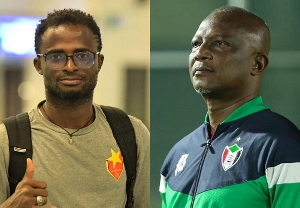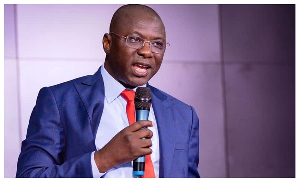Osahene Kojo Boakye Djan: Is he the right candidate to lead combined Nkrumaists? parties for the 2008 elections?
As the 2008 elections (presidential and parliamentary) draws closer, those who wants to succeed John Kufuor as Ghana?s next president are presenting their ?manifestos? or policies that they will pursue when in government to the Ghanaian people.
Osahene Kojo Boakye Djan, who was the number 2 man to Flt Lt Rawlings during AFRC regime, is determined to become the flag bearer for the combined Nkrumaists? parties.
Osahene Kojo Boakye Djan, a soldier, journalist and politician bust unto the Ghanaian political scene on June 4th 1979 when he led a group of young junior officers and other ranks of Ghana Armed Forces to take over the government from the Supreme Military Council then headed by Gen Akuffo.
Capt Boakye Djan and his men, including Capt Kwabena Baah-Achamfuor, Major Mensah Nunoo and others (the average age of the group at the time was 27yrs old) sprung from jail their comrade and populist officer Flt Lt Jerry John Rawlings and made the spokesman of the junta, Armed Forces Revolutionary Council. Under their 3 months ?house cleaning excise? rule, 3 former military rulers and 5 senior officers of the Armed Forces were put before the firing squad at the Military Training Academy in Teshie, Accra and executed.
At the end of the three months rule of the junta, the young revolutionaries handed over to the civilian government of Peoples National Party, under the leadership of Dr Hilla Liman. Shortly after handing over to the elected civilian government, Boakye Djan and some of his AFRC colleagues left the country to study in United Kingdom and United States. Rawlings refused the offer of study abroad and remained in the country.
On 31st December 1981, barely 2 years after handing over the reins of government, Flt Lt Rawlings, covertly supported by some of the political establishment overthrew the elected civilian government. Boakye Djan, who was then studying in United Kingdom called the overthrown of the PNP government unconstitutional and illegal and was critical of his best friend Jerry Rawlings, thus started the bitter feud between them. As results, Boakye Djan stayed in exile until 2000 when Rawlings handed over to New Patriotic Party after almost 20 years as Ghana?s head of state.
Appearing before the National Reconciliation Commission that was set up by the NPP government, based on the South African Truth and Reconciliation Commission to right the wrongs of the past, Osahene Kojo Boakye Djan, flanked by some of his AFRC colleagues, defended the record of his regime. However he apologised for the loss of life that occurred in the 3 months of the AFRC rule, perhaps the darkest period in the country?s history when lawlessness reign.
Osahene?s grand development plan
Having spent over half of his adult life in exile, Osahene took the opportunity to study the emerging economies of Latin America, Eastern Europe and East and South Asia. Interviewed by this writer, Osahene stated that when the Nkrumaists? win the presidency in 2008 they will introduce a 4 year development plan, from grand infrastructure projects, such as building motorways to link all the regions to rail road from the south to the north, drastic land reforms, comprehensive poverty eradication policies to human development.
On human development, Osahene emphasised that the level of skill shortage in the country is frightening and stated that the situation has been exacerbated by the massive brain drain that the country suffered in the past and is still experiencing under the current government. Boakye Djan acknowledges that the numbers of skill professionals outside the motherland are more than those at home.
He explained that his government would undertake massive development projects that would require more skill labour. To address the skills shortage, his government would increase the national budget on education in state schools to about 25% and increase subsidies to some of the not-for-profit private schools to increase the intake of children from poorer background. Osahene stated that the old CPP concept of the Young Pioneer movement would be looked at, taking into consideration the educational needs of the country as the country prepares for the take off. He said Nkrumah?s Young Pioneer Movement concept was based on tribal integration and unity among boys of all school going age. Osahene recollecting his childhood days in the Young Pioneer Movement stated the movement gave him the opportunity to forge friendship with boys from different parts of the country and this unity continued during his military days. Osahene vowed to set up a committee to look at movements that would encourage the unemployed youth to help them gain skills and contribute their quota towards national development. He emphasised that all would be given opportunities irrespective of tribe and social status.
The essence of introducing the Young Pioneer Movement is to encourage all Ghanaian children to attend school and this Osahene observed would be at the panicle of his administration. Osahene decried the present school system in Ghana and explained that the system needs a radical shake up. He also stated that the spending in tertiary education would be increased, especially in sciences and technology at the Polytechnics and Teacher training schools. Teachers and National service teachers who chose to go to live and work in the rural and farming communities would be given incentives, including staff quarters and a pool of transport for schools.
Osahene said the same incentives would be given to medical staff as well and explained that since the majority of the citizens live in the rural areas, under the Nkrumaists? government, rural development would be given much prominence.
On land reform, Osahene agreed that the colonial land system left us by the colonialists and the role of chieftaincy in land affairs had meant that most governments, both civilian and military, did shied away from executing drastic land reforms. In order to have a comprehensive commercial agricultural system, government must intervene in the distribution of land, either taking a long lease from the chiefs or encouraging collaboration between the chiefs and the commercial agricultural farmers.
Osahene agreed that the pressure for land in Ghana is mainly in the cities and this is where the legislation to regulate the land distribution system will come to bear. Osahene raised the issue of rising inequality between the urban elite and the rural folks. Poverty in the rural areas is such that more and more people are moving into the cities, thus causing the cities to over choked, putting pressure on utilities and primary health care. Children are forced to abandon school to go out and hawk in the streets, some staying on the street much longer. Hence the Nkrumaist government would invest more in the rural areas through the local assemblies and traditional councils to encourage more investment in indigenous industries and farming by delivering services at the local level.
The Nkrumaists would move away from command economy of yesteryears, a system that has proved to be a disaster in Eastern Europe and part of Asia in the 1970s and 1980s. The Nkrumaists will encourage small and medium sized firms to invest in the middle belt and the North by giving them incentives and cutting red tape. Researchers will be given more resources to research into how the nation can increase food production. Indigenous produce will be protected by increasing tax on imported goods such as rice and tined tomatoes. Domestic companies would be given incentives and help to produce more for export into the rest of the continent. Osahene explained that the system would be a mixture of Import Substitution and Export Led growth.
On housing, Osahene said the first two years will witness massive investment in building low cost houses for the people. People will be encourage to take up mortgages to pay for their homes as well as being encouraged to pay for utility services and property rates. In effect encouraging home ownership and making people to use the banking system and fostering savings. By saving more that the government can borrow from the local banks to build more infrastructure and other socio-economic developments. Osahene is the second politician to publicly acknowledge the importance of the contributions of the Diaspora community in national development. Like Kwame Addo Kuffuor, Osahene also want to establish partnership between the Diaspora community and the government in all areas of governance. Osahene also stated that the Nkrumaist government will revisit some of the projects that Nkrumah could not undertake due to the 1966 coup. He explained that these projects would be looked at in the context of the present needs and affordability.
On road building, Osahene explained that the massive expansion needed in roads and railroad can be financed by sourcing local loans. He said this can be done by selling government bonds. The system would be self financing by introducing road toll on all the major motor ways and trunk roads. Better lighting and road calming systems would be introduced to limit the number of accidents on our road.
With this comprehensive policy, what the Nkrumaists? parties should look to unite under one party and a single candidate? The question is, can Osahene Kojo Boakye Djan unity the Nkrumaists parties under his leadership? Time will tell.







![NPP Flagbearer, Dr. Mahamudu Bawumia [L] and NDC Flagbearer John Mahama NPP Flagbearer, Dr. Mahamudu Bawumia [L] and NDC Flagbearer John Mahama](https://cdn.ghanaweb.com/imagelib/pics/869/86902869.295.jpg)











